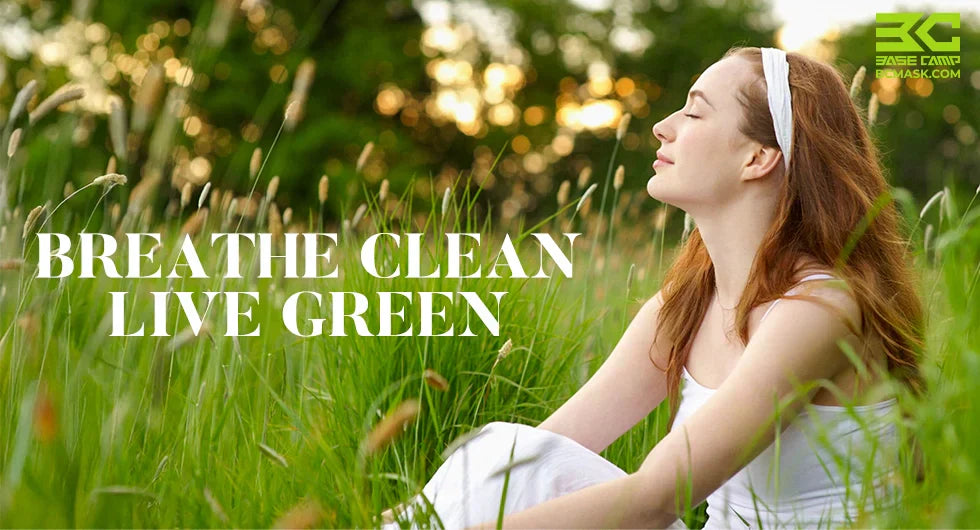BASE CAMP mask has emerged as a leader in sustainable respiratory protection with its slogan, "Breathe Clean, Live Green." This philosophy drives its mission to provide high-quality masks, respirator cartridges, and spare parts that not only protect wearers from airborne particles, allergens, and COPD but also contribute to environmental conservation. By adhering to rigorous testing standards and incorporating eco-conscious design, BASE CAMP mask delivers products like woodworking mask and wood dust respirators that combine functionality, safety, sustainability, and efficient shipping.
1. The CE Certification: Setting a Standard for Excellence
CE certification is a mark of compliance with European health, safety, and environmental protection standards. For BASE CAMP mask, achieving the CE certification means undergoing a layer-by-layer evaluation of critical inspection indicators. These metrics ensure that each mask meets or exceeds stringent benchmarks.
Key Indicators of a Qualified Mask
-
Filtration Efficiency
- Filtration efficiency is a primary criterion, measuring a mask’s ability to block airborne particles. For woodworking masks, the target is filtering particles as small as 0.3 microns, including fine wood dust and pollen. BASE CAMP achieves a filtration rate of up to 99.6% using multi-layered filters embedded with advanced materials like melt-blown cloth and activated carbon
-
Breathability
- A balance between protection and comfort is crucial. CE-certified masks must maintain airflow resistance below a specific threshold to ensure wearability over extended periods. BASE CAMP MASK’s mesh material improves airflow by 11.3%, surpassing standard requirements.
-
Leakage Ratio
- Fit testing evaluates how well the mask seals against the face. A high-quality wood dust respirator like BASE CAMP MASK minimizes leakage through advanced adjustable straps and ergonomic design.
-
Material Safety
- Every layer of the mask is tested for non-toxicity and hypoallergenic properties, ensuring the product is safe for all-day use.
-
Durability
- Masks must endure wear-and-tear without compromising performance. BASE CAMP MASK’s reusable design, coupled with replaceable filters, underscores its durability.
-
Environmental Impact
- BASE CAMP MASK incorporates sustainable materials to reduce environmental waste, aligning with its green mission.
2. Academic Analysis of BASE CAMP Woodworking Mask Testing
To maintain transparency and credibility, BASE CAMP mask collaborates with independent testing labs to validate its claims. Here is a detailed analysis of test results:
-
Particulate Filtration Test
- Results show 99.6% filtration efficiency for particles as fine as 0.3 microns. This ensures protection against wood dust, making it an ideal choice for woodworking professionals.
-
Airflow Resistance Test
- Testing confirms that BASE CAMP maintains low resistance levels, ensuring comfort even in high-exertion environments like woodworking shops.
-
Seal Integrity Test
- Conducted using human test subjects, this test confirms minimal leakage rates, meeting the CE standard for occupational respiratory equipment.
-
Environmental Footprint Analysis
- BASE CAMP uses eco friendly materials and reduces single-use components. This commitment lowers the overall carbon footprint compared to traditional disposable masks.
3. Role of Environmental Protection in Mask Design
BASE CAMP's "Breathe Clean, Live Green" ethos reflects its dual focus on user safety and ecological responsibility. Here’s how this philosophy manifests in its products:
- Eco-Friendly Materials: BASE CAMP sources biodegradable or recyclable materials to reduce waste. Its durable design further minimizes the need for frequent replacements.
- Sustainability in Manufacturing: BASE CAMP optimizes its manufacturing process to lower energy consumption and reduce emissions.
- Reusable Features: The replaceable filter system ensures that only the core filtration components are discarded, significantly reducing waste compared to disposable alternatives.
4. Why Choose BASE CAMP Woodworking Mask for Woodworking?
For woodworkers, the choice of respiratory protection, including GVS face masks, is critical for the discussion of all things woodworking and carpentry, power tools, and hand tools. The fine furniture dust generated during woodworking, including fiberglass dust, poses significant health risks, from respiratory irritation to chronic conditions like silicosis. BASE CAMP provides the following benefits:
- Superior Protection: Filtration systems effectively capture fine particles generated during sanding, cutting, or grinding.
- Enhanced Comfort: Adjustable straps and lightweight materials ensure all-day wearability.
- Long-Term Sustainability: Reusability aligns with the eco-conscious values of many professionals.
Conclusion
BASE CAMP’s commitment to "Breathe Clean, Live Green" elevates it beyond being just a manufacturer of dust mask for woodworking. Its pursuit of CE-certified quality and environmental responsibility represents a holistic approach to respiratory protection. Whether for hobbyists or professionals, BASE CAMP’s products exemplify the balance between safety, comfort, and sustainability—ensuring that every breath counts for both the user and the planet.



Share:
The Science Behind Advanced Filtration Materials: Exploring Melt-Blown Cloth and Activated Carbon
Los Angeles Wildfire Safety: Dust Mask Guide for Protection